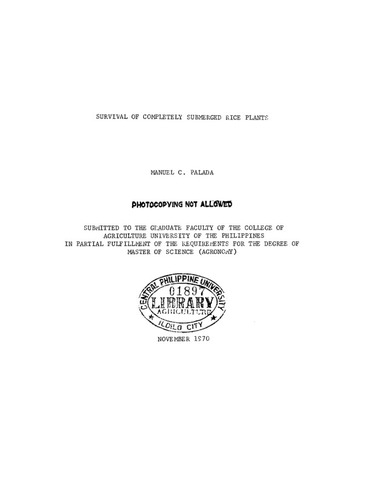Survival of completely submerged rice plants
| dc.contributor.adviser | Vergara, Benito S. | |
| dc.contributor.author | Palada, Manuel C. | |
| dc.date.accessioned | 2022-02-28T00:29:52Z | |
| dc.date.available | 2022-02-28T00:29:52Z | |
| dc.date.issued | 1970 | |
| dc.identifier.citation | Palada, M. C. (1970). Survival of completely submerged rice plants (Unpublished Master's thesis). University of the Philippines at Los Baños, Laguna. | en_US |
| dc.identifier.uri | https://hdl.handle.net/20.500.12852/1962 | |
| dc.description | Abstract only | en_US |
| dc.description.abstract | The survival of rice plant under completely submerged condition is influenced by the duration of submergence, water temperature, water turbidity, light intensity, water depth, stage of growth, variety and nitrogen level. The critical duration of submergence for survival in direct seeded rice at seedling stage is 8 to 10 days and 6 days for transplanted seedlings. The plants can survive better when submerged in lower water temperature, clearer water, high light intensity, shallower water, and low nitrogen level in the soil. Varieties that are relatively taller after submergence can survive better than varieties that are short. The rice plants have greater resistance to submergence at later stages of growth. Since the initial and final amount of nitrogen and carbohydrates in the plant are determined largely by the factors that influence the survival of submerged plants, the resistance of the rice plant to complete submergence is dependent on the quantity of these two components. In all cases, submergence causes a remarkable reduction in grain yield. | en_US |
| dc.description.sponsorship | International Rice Research Institute | en_US |
| dc.format.extent | 98 leaves | en_US |
| dc.language.iso | en | en_US |
| dc.subject.ddc | GSL Theses 633.18 P171 | en_US |
| dc.subject.lcsh | Rice | en_US |
| dc.subject.lcsh | Rice--Effect of floods on | en_US |
| dc.subject.lcsh | Plants--Effect of floods on | en_US |
| dc.title | Survival of completely submerged rice plants | en_US |
| dc.type | Thesis | en_US |
| dcterms.accessRights | Not publicly accessible | en_US |
| dc.description.bibliographicalreferences | Includes bibliographical references | en_US |
| dc.contributor.chair | Vergara, Benito S. | |
| dc.contributor.committeemember | Pantastico, B. | |
| dc.contributor.committeemember | Tilo, S. N. | |
| dc.contributor.committeemember | Obordo, R. A. | |
| dc.contributor.department | College of Agriculture | en_US |
| dc.description.degree | Master of Science (Agronomy) | en_US |
| local.subject.scientificname | Oryza sativa | en_US |
이 항목의 파일
This item appears in the following Collection(s)
-
Theses [10]


